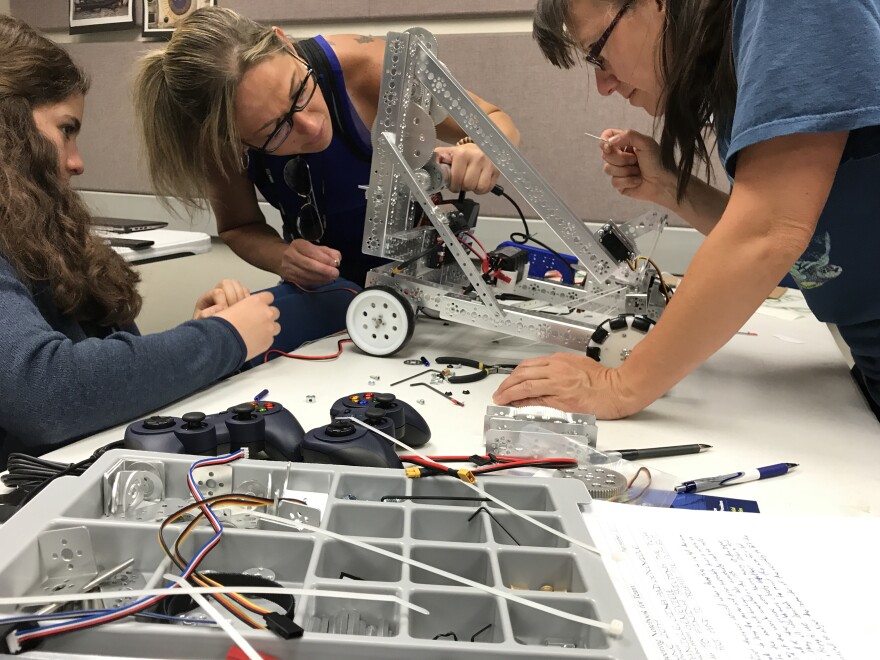From ATMs to self-checkout lines, automation technology is everywhere. And there’s a growing fear that as technology advances it could eliminate millions of American jobs.
According to at least one report, our region is especially vulnerable, having three of the top five states most at risk. But some here are already taking steps to help soften the blow.
Democratic presidential candidate Andrew Yang thinks the threat posed by automation is so dire, he’s made it one of the central themes of his campaign.
“We automated away 4 million manufacturing jobs in Michigan, Ohio, Pennsylvania and Wisconsin. And we’re about to do the same thing to millions of retail jobs, call center jobs, fast food jobs, truck driving jobs and on and on through the economy,” Yang said during the first Democratic Presidential debate in June.

And some of that automation is already happening here. Take Las Vegas, for example.
In Sin City, automation goes way beyond gaming. From the Strip, you can take a self-driving Lyft to your hotel. There you can check in using an automated kiosk. And when you order dinner or snacks, you can have it delivered to your door by a robot.
And that mixed drink while you game? Some casinos have automated bartenders back in the kitchen making your cocktails.
At one noisy bar called Tipsy Robot, you can actually order a drink that’s mixed, shaken and poured by a giant mechanical arm.
There is a human bar here, too, but most people seem more interested in watching the robot shake up their cocktails. Human bartender Jasmine Rush isn’t too worried though.
“A lot of people tell me that they’d rather talk to a bartender and have a human make their drink over a robot,” Rush says.
Cocktail waitress Hannah Myers isn’t concerned either. She’s worked on the Strip for the past 19 years.
“Progress does not mean we’re going to lose our jobs," she says. "It just means how we perform our jobs is going to be different.”
Still, Myers says she feels safe, primarily because of her union contract.
“The contract gave us a voice and that was huge for us, as it gave us respect,” Myers says.
Myers is talking about a 2018 contract negotiated by the Culinary Union in southern Nevada. Bethany Khan is the union’s spokesperson.
“Companies introducing technology to eliminate jobs is not a new idea. Our hospitality jobs will continue to change and evolve as they always have, and we’re not going to allow workers to be discarded,” she says.
Khan says the contract comes with some key guarantees for its 60,000 union members. First, companies have to provide a six-month notice of any new technology that could impact a union worker. They also have to provide free re-training for any new technology on the job, and they must provide six months of health care benefits to unionized workers who are laid off due to technology.
That all helps to keep employees on the job. And she says that’s good for guests, too.
“Customers already don’t like many things, like self-checkout lanes and automated voice wormholes when you call a 1-800 number," Khan says. "So, I think many companies have responded knowing that customers do not like those things.”

Of course, not all workers have a union looking out for them. Alastair Fitzpayne is the executive director of the Future of Work Initiative for the Aspen Institute, a nonpartisan think tank.
“Automation is playing a big role in changing the work that can be done, and for some people, it’s making it very difficult to find and continue to enjoy the kind of standard of living that they used to have, and the jobs they were performing,” he says.
Earlier this year, his group released a report looking at the impacts of automation—and what can be done to help workers. Things like increasing investments in worker training from both the public and private sectors.
“We as a program have been advocating for creating a worker training tax credit to encourage companies to invest in their workers in the same way that they’re investing in research and development,” he says.
Some new training efforts are already underway here.

This summer, educators from across Nevada took part in a robotics academy funded by Tesla and developed by the University of Nevada and the Desert Research Institute. The goal? Give teachers the skills to launch their own robotics programs.
Participant and elementary school P.E. teacher Justin Dawes was inspired.
“We’re going to have a club where the kids can sign up, and then we’re going to build them, we’re going to show them how to build them, the different robots," he says. "Then they’re going to learn how to code it, all in elementary school.”

Dawes says this kind of thing was never really on his radar when he started teaching. But he soon saw the need for this kind of specialized training.
“Technology is our future. We’re moving into online classes, so robotics and being able to do it over the internet is something that’s feasible,” he says.
Dawes launched a robotics club this year at his school, for students in 3rd through 5th grades.
This story was produced by the Mountain West News Bureau, a collaboration between Wyoming Public Radio, Boise State Public Radio in Idaho, KUER in Salt Lake City, KUNR in Nevada, and KRCC and KUNC in Colorado.







